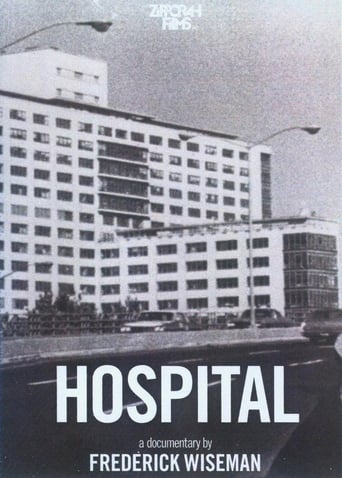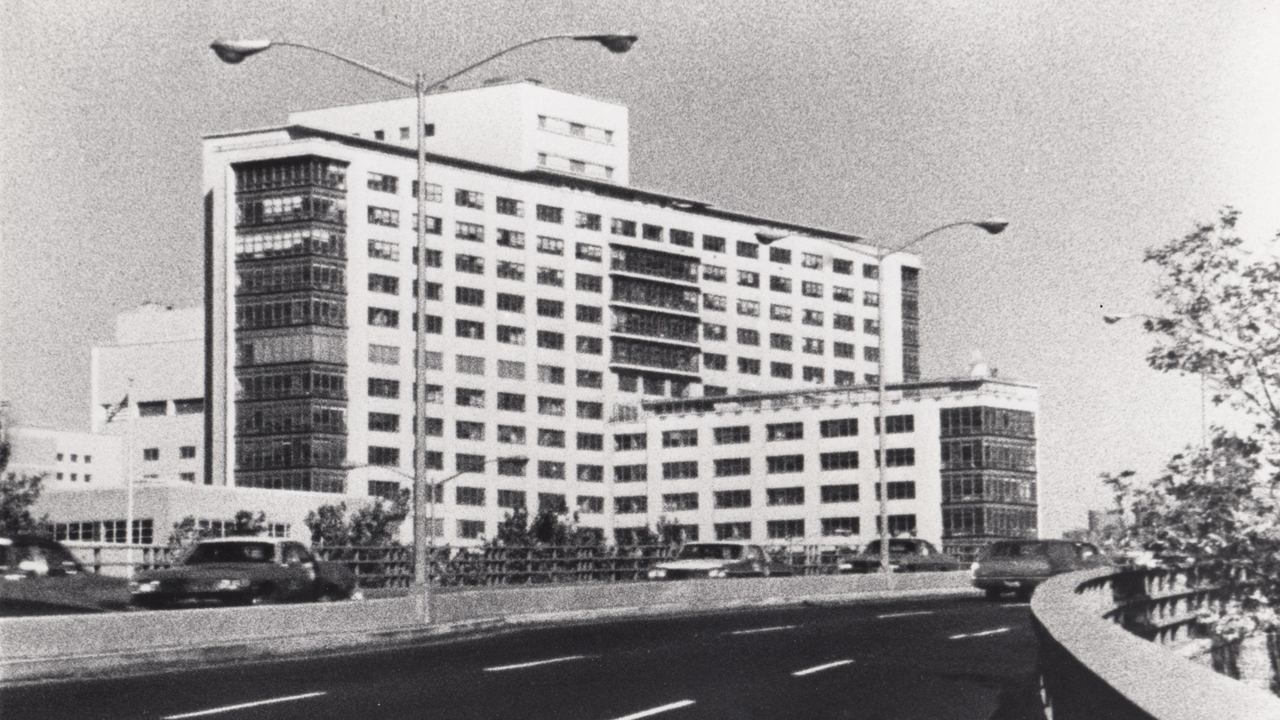tieman64
More horror film than documentary, Frederick Wiseman's "Hospital" begins with a patient's stomach being cut open by doctors. Wiseman's camera then peers inside the bloody gap, a moment which perhaps signals Wiseman's intentions with "Hospital": to peer into a sphere of human life which man routinely keeps sanitised and concealed.The most exploitative of Wiseman's films, "Hospital" takes place within a bustling American hospital. Patients come and go, doctors dart back and forth, and bodily fluids and bleach fight a perpetual war. One patient starts to cry when a doctor asks to examine his penis, another recounts the death of a loved one, and many other men, women and children are watched as they expose an emotional and physical nakedness which films seldom reveal. On the level of ethics, Wiseman shouldn't be showing this – some patients seem tricked into allowing themselves to be filmed – but on the level of art, the film offers something raw and important. For Wiseman, the hospital epitomises life at its most corporeal. This is the human body reduced to pain, torture and suffering, folds of fragile flesh clinging feebly to a decaying framework which jaded doctors and valiant nurses do their best to keep together."Hospital" ends at a hospital chapel, where an elderly priest speaks of God, Christ, spirits, sanctity and holy realms. It's the antithesis of Wiseman's previous 90 minutes, man clinging to beliefs in immortality and immateriality, longing desperately for some respite, some existence outside the hospital walls. For Wiseman, life itself seems to be a hospital. And then you die.8/10 – Filmed in horrific blacks and whites, this is Wiseman's most nauseating film.
Tamara Ta
I thought the movie was very useful for those who never had the chance to witness how hospitals in the US operate. It was simple, which made it even more realistic. I don't know whether this was due to selection bias or just representative of the true demographics of that hospital's ER, but the predominant groups in the hospitals were the white, mainly male doctors, while the patient population consisted of all the groups we know as under-served; those including druggies, alcoholics, the elderly, the uninsured, immigrants, those who didn't speak English well, and the mentally ill. Maybe that would be obvious, but it wasn't to me, I assumed there would be more of the middle class well off who had sudden issues but the majority of cases were people who struggled a lot financially and mentally. I found that the doctors were less hurried, more adept in good bedside manners, and would spend more time with each patient, especially in a place like the ER, and how different that is from the modern physician. Otherwise, it seems it does not differ so much from what a hospital looks like today; everything is sterile, doctors in white coats, with gloves, etc... The patient who was clearly a transsexual and who was a prostitute was heartbreaking. The doctor did a great job trying to explain his cause and that minor's need for welfare. The hospital staff does a lot of stuff not to just give medicine and have the patient undergo surgery, but it also involves looking for welfare for some, providing shelter for little kids who have been neglected (like that little boy whose grandmother was drunk and didn't go to the hospital to pick him up), reasoning with people who need to stay but don't want to and don't understand English well. They are involved actively in patients' lives, their kids, social work, and their financial security for AFTER the hospital visit. That was the best part of the hospital documentary. I should mention that with some cases, like the Russian? obese woman who was in the hospital bed (around the end of the movie) and her daughter couldn't understand what was going on, I didn't understand what was going on either. Maybe it would kill (or not) the realistic nature of the movie, but maybe some captions or subtitles should be added per patient case describing the diagnosis and prognosis and what happens next for them.
Steve Pulaski
Hospital is the third Frederick Wiseman picture I've seen, as I slowly but surely peruse through his unbelievably checkered and well-rounded filmography. His first film I saw - his controversial debut documentary Titicut Follies, which focused on the poor treatment in an insane asylum in Massachusetts in the 1960's - is required viewing to say the least, in its deeply disturbing, eighty-four minute glory. The second film I saw by him was Belfast, Maine, a somewhat somber but beautifully detailed portrait of a quiet Maine town built up of a largely older population with a conservative, old-fashioned work ethic.I emerge from his film Hospital with great news once more. Wiseman carefully documents the daily occurrences inside the Metropolitan Hospital in New York City using his trademark "let-the-events-do-the-talking" way of documentation. I hesitate to use the term "observational" as I did in my reviews of his two other films because Wiseman has stated again and again that unbiased, objective filmmaking is impossible. I've come to agree. The director of the film chooses what to show, what not to show, what to include in the film, how to edit it, and so forth. You decide on everything, from a narrative and a thesis, to a message and maybe a piece of social commentary. That is biased filmmaking; there's nothing else refuting it. However, one can't blame mistaking Wiseman for seeming like an objective filmmaker. His style of filmmaking is not intrusive at all and his documentation of an institution, an event, or a specific place isn't burdened by title-cards, descriptions, or personal input. He turns the camera on and let's it roll; I'm not sure I could remain silent during my own film.And so Wiseman zealously films the Metropolitan Hospital, its waiting rooms, operating rooms, outpatient procedures, surgical rooms, front desks, its patients, those already admitted, and so forth. Some patients we get to hear speak directly to the camera and others we examine for a lengthy period of time. The most unforgettable is probably a young man who has ingested far too many pills that have could possibly justify his jittery, nervous behavior and his constant neurotic attitude that he may die. He talks to the doctor, often repeating, "am I gonna die," to which the doctor is calm and very assuring. The doctor gives him some liquid that makes him vomit up the pills before sending him to psychological therapy, as he is clearly unstable, even before he took the pills.Some scenes involve the doctors talking over medical procedures or deciding how to treat a specific case. One of them isn't a medical one at all, but a kid who is brought in who is found with no adult supervision whatsoever. Several doctors converse, trying to decide whether to keep him there for a while or send him over to the child services. This shows unconventional decisions that don't come with a rulebook occur with doctors every day. Many of us know this, but I doubt we've thought very hard about it. This is where the concept of personal ethics come into play in a very serious job setting. Wiseman captures the anxiety and the uncertainty beautifully.I feel I could talk about a Wiseman film forever, but I purposefully try to keep them concise and vague, so you, the potential viewer, lacks a biased mindset when entering a film like this. Hospital is a documentary that shows that there are extremely interesting and significant things to see and show all around us, but they go unnoticed because the public demands a more extravagant, gossipy story. Wiseman scales back and allows the ordinary to morph into the extraordinary.Directed by: Frederick Wiseman.
Agent10
Frederick Wiseman really set a new standard in regards to the Direct Cinema and the Cinema Verité movements. This is a very jarring experience for people who aren't used to watching documentaries. Once you see the part where the man starts puking all over the floor, one realizes the power of the moment reflected in this film. One of the best early documentaries, if not the best.


 AD
AD

